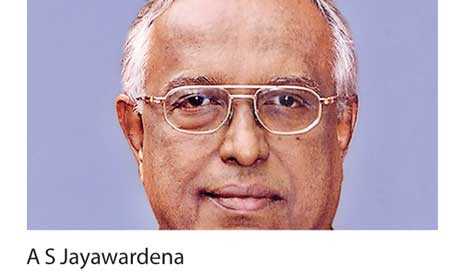Sunday Feb 22, 2026
Sunday Feb 22, 2026
Friday, 1 June 2018 00:01 - - {{hitsCtrl.values.hits}}
 By Dr. P.B. Jayasundera
By Dr. P.B. Jayasundera
The demise of A.S. Jayawardena, former Governor Central Bank and Secretary to the Treasury will no doubt leave a notable lacuna particularly at intellectual gatherings, which he attended more often than not. Although he is physically no more with us, we will continue to remember him from different perspectives.
He was a lovable and caring person to his family and colleagues alike. He never felt uneasy to work with younger officials. He favoured merit-based promotions over seniority and he compelled analytical thinking and meticulous work. As a mentor who nurtured many young economists, he gave our generation of economists the most valuable on the job training on economics, monetary policy analysis, macro-economic management, annual report writing, policy document formulation, development banking, taxation and public expenditure management, to name a few. Above all, he tried to inculcate in us the professional discipline required of Central Bankers.
His contribution to institutional capacity building of the Central Bank, while aligning its relevance as a modern Central Bank and his influential role in public policy management, is incomparable to that of any other.
He was simple, resilient, and he always remained calm. He is an icon of integrity and hard work. I was fortunate to be among those young at the time and his guidance helped me in so many positive ways. I moved up the ladder in my career, witnessing his remarkable leadership at both the Treasury and the Central Bank.
At the time H.B. Dissanayake was the Governor, Jayawardena being the Senior Deputy Governor was bold enough to advise President Wijetunga against the infamous May Day Package, stating it is a disastrous measure in terms of macro fiscal policy consequences. On a humble note, I was also associated with this analysis with Jayawardena as a Senior Economist of the Central Bank and as an Advisor to the Treasury, at the time.
He shaped up 1994 – President Chandrika Bandaranaike Kumaratunga’s Government policy agenda as the Secretary to the Treasury, cleverly balancing centre left thinking within a market friendly policy framework. He played the lead role in taking certain critical decisions, such as the removal of the flour subsidy in 1995. As the Governor of the Central Bank, he gave leadership to convince the Government to adopt a free float exchange rate system in 2000. He spearheaded the task of rebuilding the Central Bank from the destructions caused by LTTE bomb blast on 31 January 1999, so much so that the Central Bank managed to continue with business as usual, from the very next day.
He gave leadership to a policy transition during the time of the cohabitation Government in 2002 and performed well as Chairman of the first Private Sector dominant five-member Monetary Board. He continued to hold office as Governor at the time the centre left Government was re-elected in 2004 and finally paved way for a transition to appoint the first private sector Governor of the Central Bank.
He was a deep thinking public policy analyst and a dependable public policy manager. His longstanding career at the Central Bank and governments under different policy regimes, gave him the wisdom and strength to be able to assist political leadership under successive governments and facilitate practical policy strategies to evolve within a market economic framework, despite his biasness towards Washington consensus.
A.S. Jayawardena led a purposeful life. He also made our lives purposeful. Dear Sir, we are ever grateful to you. You will always be fondly remembered and deeply missed.
To live in hearts we leave behind is not to die…
May you attain Nirwana
(The writer is the Former Secretary
to the Treasury.)